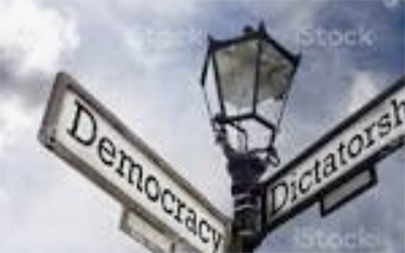

Is the US Democracy at Risk?
The role of speech
Please use the mini-case below to prepare discussion. Much as with a typical case, the substance of the evening will be delivered by the participants themselves. Moderators will briefly set up the discussion; participants, listening to each other and building on dialogue, carry the evening forward.
When you have finished preparing the case below with its references, if you would like to explore further reading, an addendum with supplementary material is here.


At least weekly, a new article appears with the fear, is our democracy under threat?
Either path threatens deepening conflict and eventual collapse of our democratic way of life. Is the US democracy at risk?
This night’s discussion focuses on one element – speech in our democracy, three of its aspects – to assess the risk.
1 Polarization
Polarization of political views has over time grown so extreme – with a gulf separating, in the end – any common ground for exchange of views has evaporated. In effect, barbs are thrown over a battlement at the opposing side, but neither side ‘listens’ to speech from the other.
With invective the sole means of ‘communication,’ what are prospects? This polarized electorate has produced a deadlocked, barely functioning Congress – supposed to be the voice of the people.
What might, instead, be some means actually to hear each other, to resolve differences? How might we get there, what steps? Are there historical precedents, guideposts, perhaps Lincoln, FDR as beacons, others? What might WE do?
2 Social media platforms
Along the way, a bulwark of our democracy, the Fourth Estate – newspapers, broadcasters who tell truth to power and inform us all – has enlarged now to include social media platforms, Twitter, Facebook / Meta, among others. Accompanying, cable channels now also combine ideological entertainment with news, on both right and left. While the vanguard of the established press have well-developed protocols for fact-based reporting, the social media platforms are still in formative years.
Particularly Facebook algorithms, which further its profit, promote group cohesion, in turn reinforcing extremity of views, on occasion without regard to fact. At the same time, when these private managements step in to moderate against falsehood, or hate, critics decry an encroach against free speech.
As further measure of social media, in the first 19 weeks of 2022, 198 mass shootings have been inflicted on the US, so far. A significant number of these killings have, when inspected for origin, found to be ‘inspired’ by politicized speech, one example ‘white replacement theory,’ dredged up from social media platforms.
Free speech is enshrined in our First Amendment. Despite some perceptions to the contrary, over time limits have been placed on speech to meet social ends. Do we have the right balance? Should more, or fewer, restraints be (put) in place?
Should that remain in the hands of private social media companies, similarly to private news organizations with their newsroom codes for fact-based reporting? If not, what can we envision?
3 Truth vs. lies
Tens of millions now steadfastly believe, and numerous candidates now campaign on, what is known otherwise as the “Big lie,“ that Donald Trump won the 2020 election, not Joe Biden. As history documents, courts, conservative and others alike, robustly rejected all claims brought forward in the attempt to adduce any evidentiary basis for this lie, more than 60 court cases. And the person promoting this lie was revealed, over his four-year term, to have lied in fact more than 30,000 times.
A profoundly somber outcome, of proceeding from the opposite of fact, further highlights. The US response to the pandemic, mimicking other fact-free proselytizing, transfixed into politicized speech. The denouement? The US passed its grim milestone, 1 million dead acknowledged from Covid – the highest of any nation in the world, when we are just 4% of global population. Some neighbor societies, without similar blockage from politicized speech, suffered as little as 17 percent of that mortality on a per capita basis, implying 830,000 unnecessary US deaths.
In our speech, how important is a standard that aims for truth-telling? Do we need to guard against the rise of the cult, which grows from the dictum in Mein Kampf redolent of a very dark past, “If you are going to tell a lie, tell a big one, and tell it over and over.“
If so, what are levers to go there? What is the role of education? How do we imbue critical thinking, character?
What should WE do?
For supplementary material in the addendum, back to the top